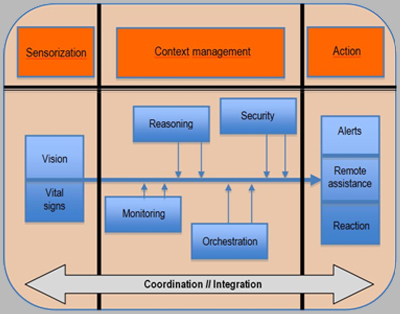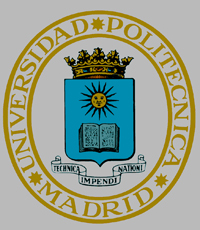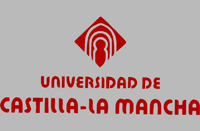Description
The work proposed in TALISMAN+ aims to develop research and experimental activities that, systematically, allow for the growing of knowledge and the innovation of procedures and technologies in a coordinated and multidisciplinary way in the area of personal autonomy. A special focus will be placed on prevention and follow-up services for people with disabilities or citizens in situation of dependence.
Because of the synergies, multidisciplinary nature and common interests among the research groups responsible for each coordinated sub-project, the TALISMAN project has an added value that will enable achievement of the following overall objectives:
i. Defining and establishing an interoperable, dynamic and extensible framework of services to support personal autonomy that effectively exploit the capabilities of very different information acquisition systems, by using knowledge based techniques, non invasive sensors and secure and reliable procedures for the citizens.
ii. Permanently install and evaluate, in the context of an accessible digital home, reliable products for prevention and follow-up in socio-health contexts that are dynamically upgradeable in accordance with the diverse use experience of the involved actors.
iii. Generating and transferring to society new solutions for key actors in the promotion of personal autonomy, developing options for real interoperability between heterogeneous and distributed technologies that use ontologies and service orchestration models.
The next figure emphasizes the division in logical layers of TALISMAN+, where there are three well distinguished levels and one more including the others. These layers highlight the need for a coordinated project clear, as well as the participation of the members of the team. First of all, on the left hand side, is the sensorization layer carried out by vision and the capture of vital and environment signals coming from numerous measuring instruments. The next layer is that of the “smart” context level, for example, the digital home where sensorial inputs are analyzed and proceed to their monitoring. Following, the reasoning and services orchestration layers will provide the proactivity displayed in the next level. Finally the security level provides the proper confidence degree to enable the interoperability inside this layer and with the rest of layers. Note that the step of generalization of the monitoring, reasoning, orchestration and security contributions is reflected by the distance to the arrow joining together the levels. In the actuation layer some contexts offering services to the users are exemplified in order to show in a practical way the preventive and reactive behaviors to promote the personal autonomy. As you can see, it shows three generic elements as alerts, accessible interaction and tele-assistance are. The interrelation among all the layers is reached by means of a global coordination and integration that during the project will be supervised by UPM.
The project is subdivided into the following subprojects:

• Sub-project TALISec+: Framework for knowledge based management of accessible security guarantees for personal autonomy (Polytechnic University of Madrid). The objective of the subproject is to develop and validate a comprehensive framework that includes interoperable modules and procedures for the provision of e-inclusion and e-health services and applications. It would involve in an accessible and noticeable way knowledge-based guarantees of security and reliability for the electronic management of the information exchanged between actors. Thus, members of the public, professionals and the technologies would interact in a secure and effective manner in the application context chosen to promote personal autonomy.
• TALIS+ENGINE: Cooperative and Semantic Hybrid Reasoning for Service Orchestration in Reactive Environments (University of Deusto). The practical effectiveness of undertaking semantic service-oriented modelling of an assistive environment with decision making procedures, undertaken by hybrid and cooperative reasoning engine, in the form of service orchestrations responding to the assistive needs of a user.
• Sub-Project MoMo: Mobile Monitoring Vital Signs (UCLM). This sub-project will investigate a proposed "framework" for multiple vital signs monitoring, noninvasive and accessible. It will develop a methodology for defining meta-modules to complement the patient monitoring plan or dependent person according to the profile.
• Sub-project vision@home: Vision system for monitoring the activities of daily living at home (University of Alicante). The research aims to develop technology infrastructure and based on vision services for monitoring and recognition of the activity carried out by people at their homes considering ethical questions about the privacy of people who are captured with vision devices.



